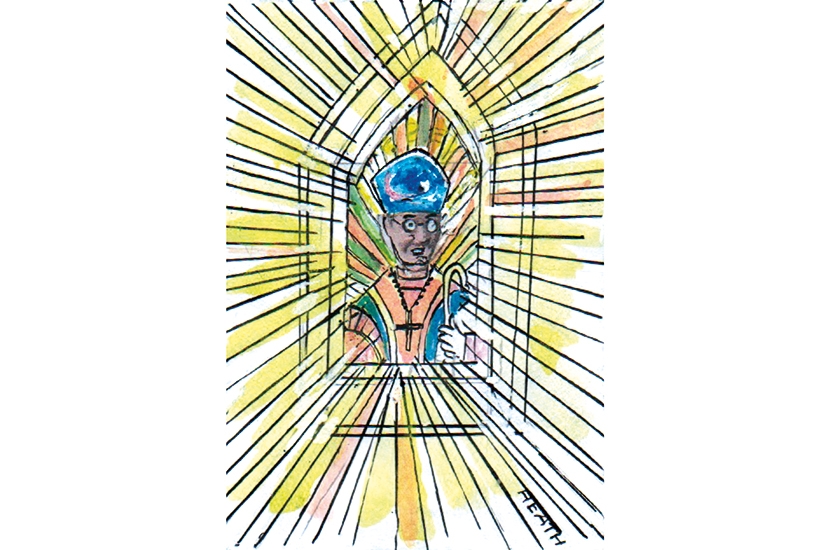This year we might sing the words ‘Tidings of comfort and joy’ to one another with poignancy. ‘God Rest Ye Merry, Gentlemen’ differs from many other well-loved Christmas carols in one respect: despite being a hopeful song, it’s written in a minor key. There is a sense of melancholy, perhaps a touch of darkness; a feeling that not all is sweetness and light. It holds together the tension of joy and sorrow.
How do we explain the comfort and joy of Jesus Christ in a year when things aren’t comfortable and they definitely haven’t been joyful?
We have an image of Christmas — idyllic, pretty, like the front of a Christmas card. We have our expectations of an ideal holiday. Perhaps we put pressure on ourselves to make it perfect: to be brilliant hosts, buy wonderful gifts and have perfect relationships.
This Christmas may not look idyllic, because it is not meant to. Christmas isn’t a time for escapism, and it’s most certainly not about another world. It is about God in Jesus Christ joining this world, living in the imperfection, and sharing in our suffering. The only thing that makes Christmas perfect is Jesus.

So we talk of comfort — but the birth of a baby in a stable because there is nowhere else to go isn’t what we would normally call comfortable.
A section of the Bayeux Tapestry shows Bishop Odo giving soldiers a sharp whack with his club. The caption reads ‘Bishop Odo comforts the troops’. Hardly comforting to us. But the key here is the syllable ‘fort’. Bishop Odo comforts the troops by fortifying them, giving strength to the soldiers when they feel weak, challenging them to return to battle.
That’s what God does at Christmas: he comforts us — fortifies us — by being with us. He turns our expectations of what we need on their head. We are offered not a mighty hero, but a helpless baby. God doesn’t come with riches and power, but amidst persecution and vulnerability. He doesn’t enter a perfect, finished world, He offers love and presence in the midst of brokenness.
The Archbishop of York, Stephen Cottrell, recalls the beautiful first line of Handel’s Messiah, taken from Isaiah 40: ‘Comfort, comfort my people.’ He says: ‘All that God has done for us in Jesus Christ; all the pains and insults he has borne for us; all the sorrows he has carried; all that has been achieved by his death and resurrection; and all the promise that is held in his birth and coming among us is summed up in this word: comfort.’
We take great comfort from the proximity of others — something so many of us have gone without this year, and we have felt it keenly. But in the birth of Jesus Christ, God offers us the chance to draw closer to Him. For now there is no distance between Creator and creation. God does not watch passively from afar when His children suffer. He changes the entire arc of the universe to be close to his people, to walk among them, to comfort them.
God turns our expectations of what we need on their head. We are offered not a mighty hero, but a helpless baby
So that’s comfort, but what about joy? Thinking about joy — or even being joyful — might feel a bit subversive this year.
The Dutch Catholic priest Henri Nouwen differentiated between joy and happiness. He said that: ‘Joy is the experience of knowing that you are unconditionally loved and that nothing — sickness, failure, emotional distress, oppression, war, or even death — can take that love away.’
There are many things to be unhappy about — and being a Christian does not mean pretending everything is fine when it is not. But I have seen the way that churches and other faith groups, local communities, charities and individuals have been offering help to those in need up and down the country. We have seen that our joy is deeply bound up in our willingness to enter into the suffering of others and walk with them through it: to be those who bring comfort to others through our presence. And true presence requires sacrifice — time, attention, care and something that costs us.
This year, the challenge of ‘comfort and joy’ holds together the hope of the world we are promised with the reality of the world in which we live. This will be a Christmas both of celebration and consolation, of grief and — perhaps — relief at the end of a difficult year. We will have to hold together our delight at birth and our despair at death, our salvation and our sorrow.
The challenge — or is it gift? — Jesus Christ embodies is to trust the light in the darkness, the power in vulnerability, the hope amidst despair and new life amidst our human frailty. God’s help looks vulnerable but is invincible. The promise of Jesus Christ, 2,000 years ago and today, is Emmanuel: God with us, always.
May God’s presence this Christmas bring you His comfort and surprise you with His joy, wherever and whoever you are.






Comments